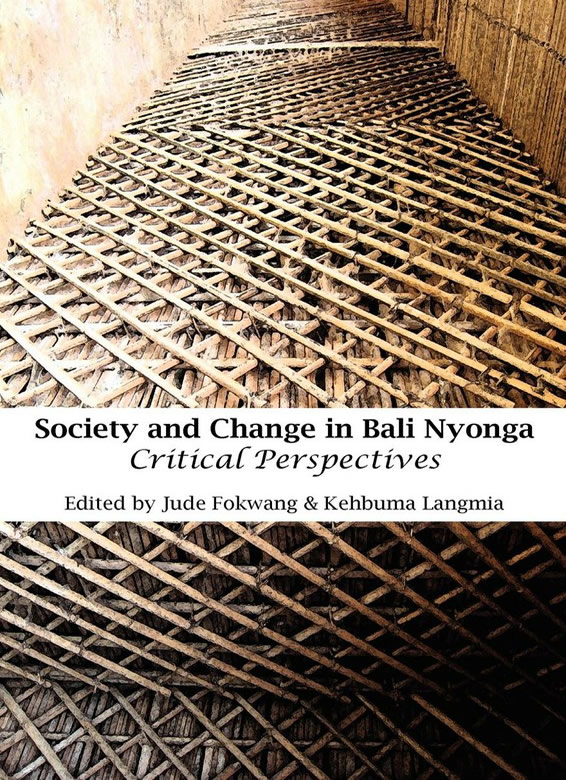edited by Jude Fokwang and Kehbuma Langmia
Critical Perspectives
Contemporary Bali Nyonga is a rapidly growing town of over 80,000 in habitants, sixteen kilometres southwest of Bamenda, the capital of the North West region, Cameroon. If Cameroon has been aptly referred to in many circles as Africa in miniature, then Bali Nyonga, since its founding in the mid 19th century is emblematic of this so-called ‘multicultural’ region. This book is about change in Bali Nyonga, but it is also about change in a typical postcolonial African setting grappling with a challenging new world reality. It aims to provide cutting-edge analyses of cultural change in Bali as well as inspire a new kind of scholarship in the Cameroon Grasslands – championed by indigenous intellectuals. The contributors to this volume come from diverse academic backgrounds and as will be evident in the various chapters, their disciplinary perspectives have largely shaped their approaches to the topics under study. Hence, this book draws on anthropological, theological, literary and media studies perspective.
| ISBN | 9789956579396 |
| Pages | 196 |
| Dimensions | 216 x 140 mm |
| Published | 2010 |
| Publisher | Langaa RPCIG, Cameroon |
| Format | Paperback |
Chapters and Contributors
- Introduction: Society and Culture in Early 21st Century Bali
Jude Fokwang - Old Wine in New Wineskin? Social Change and Traditional Religion in Bali Nyonga
Babila Fochang - Performance Aesthetics, Structure and Language of Bali Nyonga Divination Systems
Babila Mutia & Bejemiah Mecaly - Marriage and Widowhood Rites in Bali Nyonga
Elias M. Nwana & Vincent L. Nwana - Imagining Bali Nyonga Online: Online discussions of the Bali-Bawock Crisis on a Bali Electronic Forum
Lilian Ndangam FokwangLanguage Use in a Multicultural Online Community
Patience Fielding - Social Criticism through Oral Discourse in Bali Nyonga
Kehbuma Langmia - Chieftaincy at the Crossroads: Politics, Society and Customary Reform in Bali Nyonga
Jude Fokwang - Conclusion
Kehbuma Langmia - Bibliography
- Notes on Contributors






3 comments
“This book does an excellent job of analyzing certain facets of crucial developments in Bali and by extension, contemporary Africa. It crystallizes and presents its findings in persuasive essays, metaphysical reflections and insightful commentaries.”
Dr Jerry Komia Domatob Alcorn State University, USA
Dr Jerry Komia Domatob Alcorn State University, USA
“If ever there was a need for a people to establish their claim in the only way that modern day realities have imposed, namely that authorship is the only real and veritable statement of ownership, then this publication has fulfilled that need, and in resounding fashion. For a people that have been imagined, represented, possessed, and spoken for largely by curious ‘expatriates’ however well-intentioned, this is a refreshing statement of reclaiming and re-owning that which is intrinsic to their cosmology. Nothing can surpass the effort of people who heretofore have perceived themselves only through alien lenses but have now, stepped forward to establish a voice that cannot be silenced or overlooked, by adapting academic and scholastic methodologies that would stand any empirical scrutiny in their effort. This publication rejects the much clichéd and facile grain of ‘protest’ or even ‘contest’ declarations; rather, it stands on its own merit, its own coherency, and its own ethos and compels others to take notice.”
Dr Pascal P. Buma, University of Akron, USA
“There is ample truth in the cliché that those who ignore their cultural values are adrift, but it is also true that uninspired and slavish adherence to age-old values in an increasingly inter-connected world stifles creativity and progress. This book is about change in Bali Nyonga, but it is also about change in a typical postcolonial African setting grappling with a challenging new world reality. The profundity of the scholarship points to the core umbilical connection to the motherland and the understanding that only devoted and genuinely concerned researchers are able to share with such novelty and forthrightness. Anyone who reads this book taps into a reservoir of knowledge about a society facing its challenges with unbridled fortitude.”
Dr Victor N. Gomia, Kentucky State University, USA